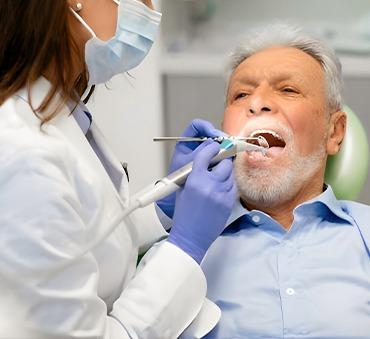Safety And Effectiveness Of Dental Implants For Diabetic Patients

Dental Implants have revolutionized replacement of missing teeth. For many people, they are considered the gold standard. But if you’re Diabetic, you might have heard concerns regarding safety and success of implants in your case.
The truth being, Dental Implants can work well for tooth replacement in diabetic patients but their success depends largely on how well controlled the diabetes is.
Why Diabetes Matters In Implant Dentistry
Diabetes is a condition that impacts healing and infection resistance.
High blood sugar levels can:
-
Slow down wound healing.
-
Reduce blood flow to tissues.
-
Weaken the immune response.
-
Increase risk of gum and bone infections.
Since dental implants rely greatly on the biological process called osseointegration —where bone tissue fuses directly to the surface of a dental implant creating a stable and strong foundation for a replacement tooth, anything that slows healing can influence the success rate.
The Role Of Blood Sugar
One of the most important factors in determining implant success rate for diabetic patients is glycemic control.
-
Well-controlled diabetes (HbA1c ≤ 7%):
Research shows success rates above 95%, almost the same as in non-diabetic patients.
-
Moderately controlled diabetes (HbA1c between 7–8%):
Slightly slower healing, but still good long-term outcomes if oral hygiene is excellent.
-
Poorly controlled diabetes (HbA1c > 8%):
Higher risk of infection, bone loss around the implant, and an early implant failure is a possibility.
At The Dental Roots, we recommend getting your HbA1c checked before planning your implant surgery. According to the results our doctors may coordinate with your physician to help stabilize your sugar levels.
Safety Measures Followed During Surgery
For diabetic patients, careful treatment planning makes all the difference:
-
Medical Assessment: Review of your latest HbA1c, fasting and random sugar levels, and any diabetes-related complications (like heart, kidney, or nerve issues).
-
Customized Surgical Protocol: Minimizing surgery time and using gentle, atraumatic techniques to preserve bone and soft tissue in strict aseptic conditions.
-
Antibiotic Prophylaxis: To reduce infection risk.
-
In some cases, allowing longer healing time before placing the final crown.
-
Close post-op follow-up appointments to monitor healing.
Effectiveness And Long-Term Success
According to studies, well-controlled diabetic patients show implant survival rates between 92–97% over 5 years which is very close to non-diabetics.
However:
-
Osseointegration may take a few weeks longer than in healthy individuals.
-
Oral Hygiene Maintenance is even more important to avoid peri-implantitis (infection around the implant).
Post Surgery Care
Maintaining excellent oral hygiene- brushing twice daily, flossing, using interdental brushes and water flossers is crucial.
Attend all follow-up appointments.
Avoid smoking- it further reduces blood flow and healing capacity.
Monitor and Manage your blood sugar consistently.
Dental implants can be a safe and highly effective solution for diabetic patients, provided your diabetes is under control and you commit to meticulous oral care.
With thorough preparation, skilled surgical technique, and ongoing maintenance, you can enjoy the same benefits from dental implants as anyone else.
Call us at +91-8130750003 or email enquiry@thedentalroots.com to book your consultation.
Visit our clinics in South Delhi, Sushant Lok, or Gurgaon
The Dental Roots – Excellence in Dentistry.







